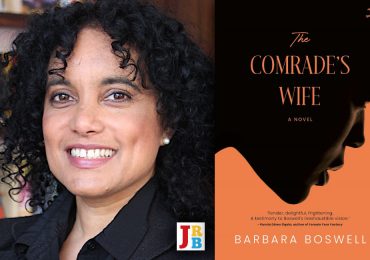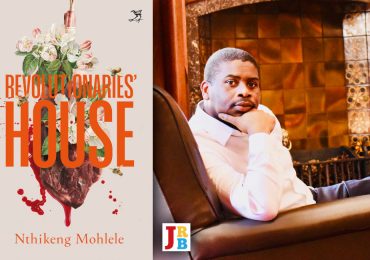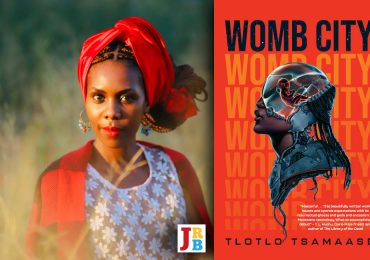Read an excerpt from Barry Gilder’s new novel At Fire Hour, courtesy of Jacana Media.
‘Here it is at last!’—Antjie Krog
Gilder is the author of the highly acclaimed memoir Songs & Secrets: South Africa from Liberation to Governance and the bestselling novel The List.
Original and forceful, At Fire Hour delivers Bheki Makhathini, a South African character study for the ages.
Suspected of betraying the ANC, the young poet leaves home for exile in 1976, and until his return home after the unbannings in 1990, Bheki writes the story of a revolution—an unfinished one.
Gilder allows Bheki the freedom to deal with the big ideas of art and love, freedom and struggle in a shrewd and vivid way, the result being an unforgettable and deeply moving tale.
In the words of Mandla Langa:
‘Despite its celebration of other writers, musicians, poets—the cultural workers, to use the parlance of the liberation movement—this, in the end is a story of betrayal and intrigue and, like Gilder’s earlier works, especially, The List, is a novel that dredges up the shameful betrayals by people whose actions precipitated incalculable losses and reversals.
‘The writer takes a lot of risks in telling this story, going deep into his imagination to recreate a series of landscapes which form the staging grounds for acts of courage, love, commitment and of course, the very obverse side of this coin. For verisimilitude, he recreates platforms, such as the Culture and Resistance Conference that took place in 1982 in Gaborone, Botswana; Culture in Another South Africa (CASA) in Amsterdam, The
Netherlands, 1987, to name a few.
‘The scenes are believable for the simple reason that the writer was present in almost all these arenas and captures the texture of the interactions among the vast gallery of players. He reconstructs conversations between the attendees, for instance, in Amsterdam writers such as the late Lewis Nkosi and Wally Serote exchange views with Bheki Makhathini and his partner Pumla, an underground agent of the ANC.’
Read an excerpt:
~~~
It’s the water that rouses him. An unwanted wakedness. Roused to the pain in the ribs, the back, the legs. Roused to blood in the mouth. To the faces and forms gathered around him where he lies. Five men. Gathered around as at an open grave. Booysens is there, holding the jug over him, the last drops splattering like dying rain.
‘Hy’s wakker, lieutenant. Die bliksem wou nie praat nie.’
‘Okay, sersant, mense, leave him with me. Let me talk to him.’ The voice is more gentle. It leaks authority.
‘But, lieutenant …’
‘No buts, Booysens. Leave him with me.’
Bheki sees the new boer throw his arms wide and usher the other four men to the door. He stands at the door until it closes, checks it is firm and locks it. He comes back to where Bheki lies and holds out his hand, takes Bheki’s in his and slowly lifts him from the floor. ‘I am so so sorry, Mr Makhathini. So sorry. This would never have happened if I’d not been out of town on other business. There will be consequences for this, I tell you.’
The new boer seems young for his rank, maybe mid-twenties. Taut, slim body. Tight blonde curls. Quite handsome … for a white man. Tanned skin. Bheki sees the brick is gone. There are feathery streaks of water on the floor where it had been. His chair is back in front of the desk. On the desk the water jug is full again alongside an empty glass, an ashtray, a red cigarette packet and a box of Lion matches. The file is still there. And a notepad. He sits. The new boer lets go of Bheki’s arm and moves to the other side of the desk.
‘Some water, Mr Makhathini?’ He pours and pushes the glass over. Bheki sips. Swallowing is hard.
‘A cigarette?’ The new boer lights one and hands it to Bheki. The smoke sears his lungs.
‘You’re a writer, Mr Makhathini. That’s good. I’m fond of literature. Look, I have a copy of your book here.’ He opens a desk drawer. ‘Amaculo, nice name for a book. Has a ring to it. What does it mean?’
Bheki does not answer. He is drawing on the cigarette. Sipping at the water. Searching down in his gut for his voice, waiting for the thickness in his throat to subside.
‘You’ve got some talent, Mr Makhathini … can I call you Bhekisizwe? Or Bheki? You’ve got some talent. But … too much politics. Too much. Politics and poetry don’t go together, you know what I mean?’
What is up with this new boer? His predecessor messed with his body. This one with his head. Really? A debate about art for art’s sake? Here? Now? In this concrete avocado?
‘You see here, Bheki’—he runs a finger down the contents page of the collection—‘all of these … all of them … are about politics. I can’t see one about love. Haven’t you ever been in love? You know’—he smirks—‘girls like poetry written for them. I wish I had your talent. I would write lots of poems for my girlfriends.’
This can’t be happening. Bheki curses the return of consciousness. But the pain is blurring, thinning as it spreads out. He opens his mouth to speak.
‘You see, Bheki boy. Take the poet, Langenhoven. Now there’s a poet. CJ. He even wrote a love poem to his dog. And his best poem—‘Dis Al’.
Bheki finds his voice:
Dis die blond,
dis die blou;
dis die veld,
dis die lug;
en ’n voël draai bowe in eensame vlug –
dis al
The new boer stands and claps his hands together. ‘Goed, Bheki! Baie goed! You know your Afrikaans literature.’ He sits down again.
There is a look on the boer’s face that Bheki cannot describe. He wants to describe it. Desperately. He will have to burn it into memory and try later when he has his notebook. If he ever gets out of here. The eyes glisten, a smile on the face but with a downturning at the mouth’s edges. Disdain? Condescension? Whatever—it sears, burns at his pride.
‘It’s not Langenhoven. It’s Celliers—Jan—FE.’
The look goes from the new boer’s face. Does the word ‘startled’ apply now? ‘What’s not Langenhoven?’
‘“Dis Al” … the poem. It was written by Jan Celliers … and it’s full of politics.’
‘Celliers. You sure? I always confuse the two. But Mr Makhathini, there’s no politics in it. It’s about the sky and the air and the veld and the birds …’
Bheki’s backside itches. He leans over to scratch, speaking as he does:
Dis ’n balling gekom
oor die oseaan,
dis ’n graf in die gras,
dis ’n vallende traan –
dis al
‘That could be any exile, Bheki. Just someone returning from a long absence to visit the grave of a loved one.’
Bheki shifts in the chair, keeping his hands on either side of his legs, pushing down to take the pressure off his backside. ‘Celliers fought in the Boer War—you can’t get more political than that. And, Langenhoven was an MP. He wrote your national anthem. Very political.’
‘Our national anthem, Makhathini?’
Bheki does not answer. He wishes for silence, for unconsciousness—oblivion. There is no logic in this exchange. No value. No dialectic. It is a game, where only one player knows the rules, the moves. Perhaps the fists and the boots and the brick were better. Rules clear. Interconnectors starkly drawn. Thesis and antithesis.
‘Now, Bheki boy, you’re an intelligent man, and—yes—you are very talented too. We are only trying to help you. That is all. We want to help you live a normal life, maybe to continue your studies and your writing. Maybe you could teach. You would be a good teacher.’
Bheki lifts his head, slowly, raising his chin from where it rested on his chest, not in supplication but in a forage for absence. ‘Teacher?’
‘Yes. Yes, Bheki. A teacher. You would be an excellent teacher, even a professor one day, hey?’
‘One day? Which day? Will I ever get out of here?’
‘Bheki, what are you saying? Of course you will … get out of here. We only need you to answer a few questions and then you’ll be home.’
‘Questions?’
‘Yes. In fact, only one question.’
‘Yes?’
‘Yes. Who is your contact in the ANC?’
Déjà vu is not the right phrase. More like déjà été. Bheki shakes his head from side to side, in slow motion. ‘I already told your sergeant, I don’t have a contact in the ANC. The ANC is banned. I’m a member of Saso.’
The new boer has his face down to the open file, rummaging through the pages. He doesn’t look up. ‘And so will Saso be very soon.’ He pulls a page out of the file with the tips of his thumb and forefinger, as if avoiding contamination, smooths the page on the desk with open hands. ‘What were you doing in Botswana?’
Bheki’s chin is on his chest again. It comes up. ‘Botswana. When?’
The man jabs at the page. ‘Last month. You were there last month. For a weekend. Who were you meeting?’
Bheki hears his own voice come from an interminable distance. There is some sort of expanding chasm between the inner and the outer. ‘I often visit Botswana.’
‘Why?’
‘I like it there.’
‘You like it? Why? So you can meet your ANC contacts?’
‘I like it because there’s no apartheid there.’
‘You what?’
‘There’s no apartheid there. Black people are in charge, and whites are welcome.’
The new boer stands up, shuts the file, moves to the door. ‘Let me call back the sergeant and his men. When you’ve had enough, you can ask for me.’
~~~





